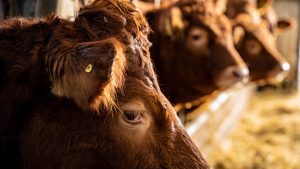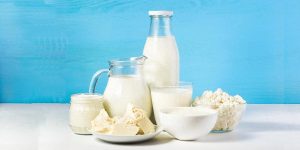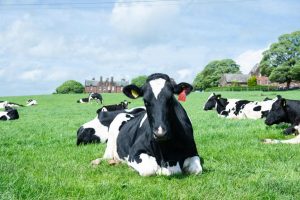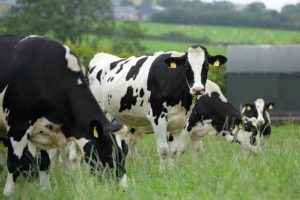
The Trimbles milk 170 dairy cows, rear all their own replacement heifers and finish most of the beef calves.
The herd is a mixture of pure British Friesian, British Friesian cross Holstein and a small number of Brown Swiss cows.
The current annual rolling herd average milk yield is 7,200 litres at 4.3 per cent butterfat and 3.30 per cent protein.
The Trimbles monitor business performance using CAFRE benchmarking and individual cow performance using Dale Farm’s milk recording service.
John and Mathew’s dairy herd has been managed organically for the last 22 years.
The decision was taken to farm organically after some detailed research into the practicalities of organic dairying and the market potential for the milk.
After a two-year conversion, full organic status was granted in the year 2000.

The Trimbles are members of a group called Emerald Organics which was formed in 2001 to market organic milk.
Emerald Organics is owned and managed by organic farmers, giving them an active input and interest in the running of the company.
Current producers are located throughout Northern Ireland and production per farm varies from 200,000lts to over 1,000,000lts.
Milk collection from farms and distribution to processors is organised by the company.

Farmers must meet specific rules and regulations to be certified organic.
These relate to the origin of the feed, type of fertiliser that can be used and management relevant to animal health.
Dairy cows must have access to grazing over the summer months, 60 per cent of the total annual diet must be in the form of forage and when housed, slatted areas must be no more than 50 per cent of the total floor area.
Gavin Duffy, CAFRE Dairy Development Adviser, highlighted that: “Maintaining soil fertility is a key element for any dairy system to maximise crop growth potential.
“Research has shown that where the soil pH is below optimum (pH 6.0 – 6.5) a considerable proportion of the applied chemical fertiliser is not being utilised by the grass.
“All soils on the Trimbles’ farm are sampled regularly and based on the results, nutrients are targeted accordingly.
“Maintaining optimum pH is not normally an issue, slurry and farmyard manure are sufficient to maintain target phosphorous levels and where potash is needed, sulphate of potash is recommended for organic farms.
“In recent years, the Trimbles have experimented with various slurry additives which are shown to have properties that accelerate the breakdown of the slurry and make the nutrients more readily available for the grass.”
Matthew commented that: “The use of chemical nitrogen fertiliser is not permitted so both red and white clover which have nitrogen fixing properties have been grown on our farm to replace bought in fertiliser.
“Red clover has been grown alongside hybrid ryegrass varieties in mixes for silage.
“Red clover requires careful management, but it has worked well on our farm producing good quality forage and reducing the need for bought in protein.
“White clover is an important addition to all seeds mixes that we use and, although spring growth may be delayed, the annual yields of a well-managed grass/clover sward compare favourably with most swards receiving nitrogen fertiliser.
“It is recommended in the organic situation that 50 per cent to 70 per cent of the grass seed in the mix is grown organically.”
Gavin continued: “Whilst good grass and forage management on the farm can significantly reduce the reliance on bought in concentrates, the cost of bought in certified organic feed is a major challenge in John and Mathew’s system, being 50-75 per cent more expensive than a similar non-organic ration.”
Gavin concluded: “The Trimbles’ approach to animal health is very similar to any conventional dairy farm.
“Every effort is made to maintain a healthy herd and reduce the reliance on veterinary intervention.
“Sick animals can be treated if needed but withdrawal periods are doubled for permitted veterinary products.
“Disease prevention is an important part of the Trimbles’ health plan and John has used homeopathy and herbal products to manage common health issues when needed.
“Good use is made of Dale Farm milk recording data in their selective dry cow therapy programme which is key in reducing the need for antibiotic use on the farm.
“Young-stock are grazed on ‘clean’ pasture or silage aftermaths when available to reduce the worm burden.”
John Trimble stressed: “The key factors for success in an organic dairy system are a healthy soil, a healthy herd and a significant premium for the organic milk.
“Organic farming poses many challenges but there is no doubt that there are some key management practices that could be replicated on most other dairy farms and improve profitability for them as well,” John added.

























